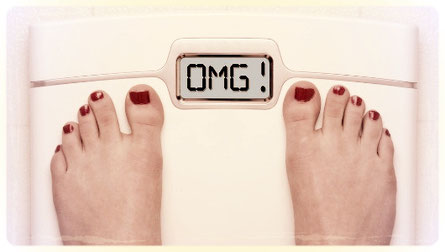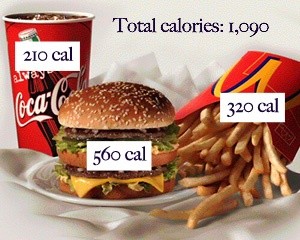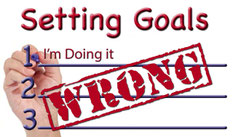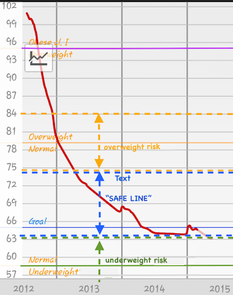
"Failure is the opportunity to begin again more intelligently" - Henry Ford
Weight loss resistance is one of the most common things. The inability to exercise or diet is sometimes very discouraging. It might even make you very unhappy and stress. But hopefully after so many positive thoughts as a new resolution we are totally into exercising, dieting or both with all our enthusiasm hoping to reach our goals if possible in a short period of time. If that is the case, congratulations! you passed the most difficult part, which really is STARTING AND GETTING ACTIVE. But is not all flowers in the garden. Sometimes something might not be working the way we want it to be ....
omg! what happened to me? i tried hard to lose weight but I see no results :S
Often, losing weight simply is not fair. In many cases, you push yourself and dedicate time but you have nothing to show for all the effort and attention you have put into your weight loss resolution. What is next?
This article is meant to look at the most common reasons why people might fail at their weight loss resolution. It came to my mind a few reasons after some brainstorming running sessions while making reminders notes with my best friend. Throughout reading out this article you might see an image of yourself and hopefully it could help you to break the endless cycle of weight loss resistance.
HERE ARE THE SECRETS
1. "Too many calories in, little burning out"
Versus "gaining other forms of weight"

Eating too many calories
This how it works. Everything we do burns calories, and everything we eat or drink (except some liquids like water or coffee or tea (with no sugar added) contains calories. Now, if the amount of calories being consumed is greater than the amount of calories being burned, we all gain weight. This is like math, it is never wrong unless we are doing some wrong calculations. This is called "caloric surplus" forcing the body to store, usually as body fat, these left over calories ideally for a later use. The good news for us is that the opposite also holds true. In other words, if the amount of calories being consumed is less than the amount of calories being burned, we all lose weight. This is called "caloric deficit", forcing the body to burn most often the accumulated body fat. This is scientifically described as energy balance (Calories In vs Calories Out). In summary, this means that if you are really not losing weight, you are simply most likely eating too many calories and in consequence producing no calorie deficit and subsequently probably gaining weight instead. One more thing.... start reading calorie labels stuck to foods and drinks! Reading food labels to make the right choices will help you to stay healthy. You will be surprised how many calories you can cut by making the right choices by simply reading calorie labels.
Watch your drinks
It can be that it is not only the food you eat what is breaking your balanced calorie intake, you should also watch what you drink. For example, if you read the calorie label of a normal coke you will should read ~ 160 kcal per can. A coke zero however has by definition 0 kcal per can which can greatly positively impact your calorie intake. Not to mention if you take more than one coke can per day. Also watch the so called fruit drinks because most of them can be more health threatening than beneficial. Even though drinking a minimum amount of 1.9 litters of water a day is highly recommended and beneficial [+INFO], one trick for fast weight loss is to eliminate drinks during your meals. Drinks mix up with food increasing the food volume and being digested like you have eaten bigger portions. Furthermore, drinking too much water during meals can interfere with the natural levels of bile and acid in the stomach, slowing digestion. A good practice would be to have some water drink or cold tea (no sugar added) ~30 minutes before lunch or dinner. Not during meals. Then allow another ~30 minutes gap after meals before you drink again. You might notice quite a weight change in your weighing scale very quickly though this weight loss most likely will happen only during the first few weeks. Later on your body will be adapted and the "few pounds under" due to water reduction during meals will remain a constant as long as you keep this practice overtime. If this sounds tough for you to do it and you feel you still need a drink during meals try to substitute it for half a glass of red wine what has been recently found not only beneficial for health but as a powerful calorie burner.
Emotional eating
Eating is really enjoyable, but when food is used as a mechanism during times of stress or sadness, it can turn to be really unhealthy. If you are an emotional eater, dealing with the emotions that feed your compulsive eating is the most important. Observing your thoughts and emotions, instead of mistaking yourself for them, allows you to break the cycle of emotional eating and will help you to start making more rational choices. One trick you can practice regularly is to eat something healthy like a fruit or veggie whenever you feel hungry and you want to control your weight. In fact a good practice would be to eat some fruits or veggies 10-20 minutes before any big meal. This will satisfy you in the meantime and lessen your hunger level, likely resulting in less calorie intake during your meal.
You are eating too fast
Many people eat too fast and they take in too many calories before they realize they have eaten enough. It might take around 5-15 mins (7 minutes in average) from the time you start eating for your brain to send out signals of fullness. Slow pace eating allows enough time to trigger the signal from your brain that you are already full and feeling full will translate into eating less. You can try this simple exercise, whenever you feel still hungry after eating a normal meals portion try to give yourself some time (~7mins) before you eat something else. Most likely your feeling of being hungry will be gone by then and you will obviously eat less calories. Slow down your eating speed and give time between meals.
Food underestimation
Perhaps the reason could be that you are underestimating how many calories you are actually eating. Various weight loss studies proved it. Some people underestimate the quantity of food they consume (like thinking you ate 1 serving when you really ate 2, 3 or 4), while others underestimate the amount of calories it contained (like thinking a meal was 500 calories when it was really 1000). Some underestimate both. Mistakes and under reporting make many people to underestimate the serving size and eat significantly more than they thought they were eating. Many other people think that there are certain foods they can unlimitedly eat and it is not counting calories like fruits and vegetables for example. But unfortunately you should also count them because everything counts even if some foods are just little calorie like a low fat yogurt. Actually this underestimating issue happens over and over again, and it might even end up not accounting for hundreds or even thousands of "I did not realize calories". So if you claim to consistently be eating the right amount of calories and still you are not losing any weight at all, then you are simply not producing any caloric deficit in your body and most likely you have done something wrong up there. If you want to avoid this miscalculations we recommend you to follow our free program for the right calorie counting.
Exercise overestimation
Another problem you accidentally may have had is actually the opposite problem, overestimating the calories you have burned. For example, you may assume that you have burned “tons” of calories doing some cardio workout but that did not actually happened. Studies show that an average person doing a typical cardio at a typical intensity will burn on average around 7-10 calories per minute. So think about that the next time you assume that 30 minutes of a slow pace walk represent some huge calorie burning because might be really not that much. You can use our exercise energy consumption tool or our free program to calculate the right amount of calorie burned by doing some of the most common exercises.
Mind-reward relaxation
Another big problem with overestimating calories burned is that it gives people a false impression. "Cool! I was doing a hard workout for 25 minutes today, so I can surely afford to eat this extra 1000 calories". Now wonder why you are not losing weight despite you are "working out hard" all the time, eh!!! If you really want to lose weight after a workout eat like you did not do any workout at all.
Making many exceptions
Many of us sometimes simply eat too much specially in some special occasions such as holiday, business traveling or family events. It is really not looking good, might even look like a bit paranoic if we try to avoid eating a lot sometimes, specially in those once a year special occasions. It is very normal and we all should join those special occasions sometimes. However, it is a common mistake to allow ourselves to happen over and over again, doing nothing and use this occasions as an excuse not to lose weight. The solution for this is really simple.. "do compensate". If one day for whatever reason you eat too much, try the next day to compensate with an extra workout or eating a bit less of calories in order to compensate the day before. If you do compensation always, you will never ever give room for any weight gain in your body. Furthermore, getting used to eating a lot even might not change your stomach size for sure will contribute to wrong reset your "appetite lipostat". However, eating less will help you to preset your appetite (easier to be satisfied) to feeling not as hungry and it may be easier to stick to your eating weight loss plan.
Gaining some other form of weight?
There is an exception to some of the statements made above and this is ... you are creating in fact the required caloric deficit and you are actually losing fat, but you might be gaining some other form of weight that is producing some sort of unbalancing in your weight loss plan. The reason is that there is differences between losing weight, losing fat, and losing or gaining muscle. Fat loss is always fat loss but weight loss however can be fat loss, muscle loss, water loss.... or even all of the above together. And since most people only monitor their fat loss by monitoring their weight loss on the scale, it might happen that you are really making progress but it is temporarily hidden because you are gaining something else (this is even more true for women once a month). This is why it is a good idea to do more than just monitoring your weight loss in a regular basis. You can also take other measures such as body fat%, muscle%, water% and take pictures once in a while to monitor your progress. In summary, this means that it is possible to lose fat while gaining something else and it might look like you have actually lost nothing. The good thing is that if this is the case it should be just a temporary situation. So if not losing any weight again and again, weeks after weeks, it is much more likely that again ... you are just eating too many calories, not really creating any caloric deficit, and you are just not losing any fat or gaining muscle, you are just gaining weight.
2. Setting the wrong goals

No written goals
Having a clear vision of what your weight loss or fitness goals are is crucial for your success, but many people give up because they expect results to take long time and dedication. If this is the case, you can overcome this non-action state by setting up realistic and short-term goals that please both your available time and weight loss or fitness needs. Interestingly, studies show that people who have bothered to write down their weight loss or fitness resolutions are more likely to succeed. The moment you write your goals, you are starting to put your mind in an "action mode" to do whatever it takes to make what you have written a reality. So if you want to guarantee success, you can start by writing down a fitness plan or weight loss plan today!
Weight loss just stopped
Were you previously losing weight but suddenly stopped? If so, this probably means that you "hit the weight loss plateau" and again most likely you are eating too many calories. A weight loss plateau is what happens when the caloric deficit you created has suddenly stopped to exist. There are multiple reasons why this might be happening but the "Calories In vs Calories Out" still holds true. It is just that the specific numbers in that equation have changed as a result of the weight loss you were already experiencing. This is in part because a calorie deficit causes your metabolic rate to slow down a bit over time (known as “adaptive thermogenesis”), but it is mostly because you have already lost some weight… In other words, the calorie intake that worked for you when you were 250 lbs does not work any more now that you are 200 lbs. And this is just another way of saying that you are eating too many calories for your new current weight and the required caloric deficit no longer exists. Set new goals. Eat a little less or burn out a little more and you will most likely break this weight loss plateau.... [+INFO]

Too near the normal BMI line
It is probably a common unknown "issue" from many fitness trainers, dieticians and even doctors to try to preset people's "ideal weight" near by "the normal BMI line" (see attached graphic; X-axis presents weight in kilograms and Y-axis represents time in years). This is a bit "risky". First, because we are not giving enough time to really "preset the ideal weight"... read more; and second because we will be so close to the "overweight BMI line" that is really easy to go back on weight again in a really short period of time. The uniqueness of our online training method is to preset people's ideal weight within what we call the "SAFE LINE" and most important to keep it over a long period of time (see graphic). By doing so any potential temporary weight gain for example because of any family event, holiday, business trip, sickness, injury or any other temporary extra caloric situation it will never translate into an overweight body since we are keeping our body weight by definition within a SAFE LINE. Furthermore, working within the SAFE LINE will also prevent you from suffering any potential future underweight episode. This is what make Virtual Personal Trainer unique since no method has been reported like this before. [+INFO]
Recommended apps







Write a comment